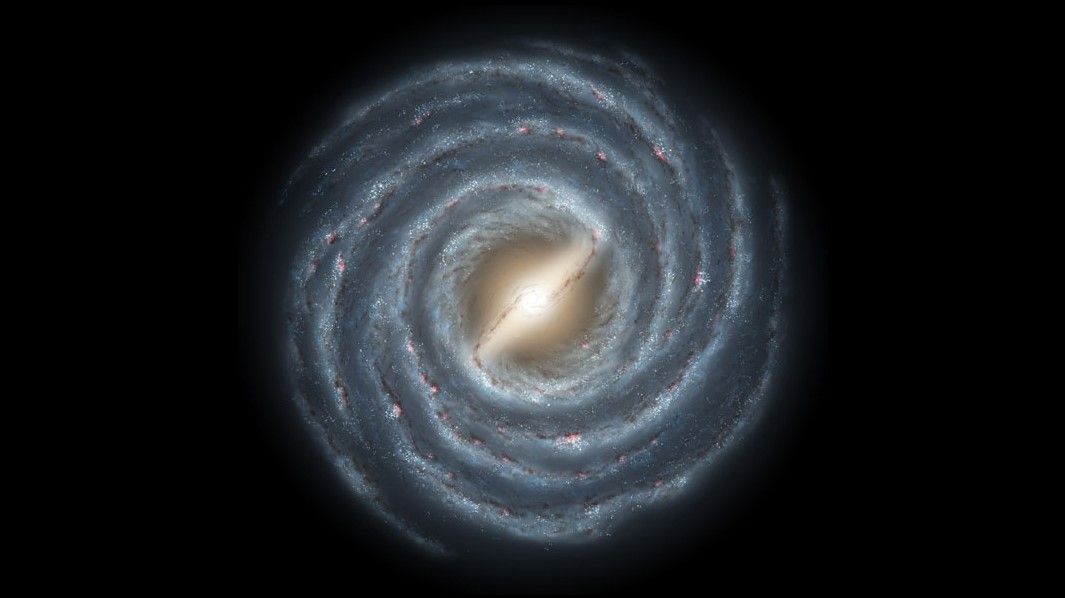Scientific investigations conducted aboard the International Space Station the week of June 14 included studies of plant gene expression, protein crystal production, and additive manufacturing in space.
Read MoreMonth: June 2021
Galveston from Space
On Monday, June 19, 1865, enslaved African Americans in Texas learned of their freedom. That day of liberation became known as Juneteenth.
Read MoreDark matter is putting the brakes on our Milky Way galaxy’s spin
The Milky Way rotates at a whopping 130 miles (210 kilometers) per second, but a new study has found that dark matter has slowed the rotation of its bar by at least 24% since its formation nearly 14 billion years ago. “Astrophysicists have long suspected that the spinning bar at the center of our galaxy is slowing down, but we have found the first evidence of this happening,” study co-author Ralph Schoenrich, an astrophysicist at University College London, said in a statement. These new findings not only shed light on…
Read MoreSpace startup Launcher to fly an orbital platform filled with CubeSats on a SpaceX rocket in 2022
Startup space company Launcher has a new satellite platform that will carry stacks of CubeSats into space, the company announced after a nearly $12 million funding round. The platform, called Orbiter, will send up to 330 pounds (150 kg) of mass to orbit. Initially, it will be used for rideshare missions that send fleets of small satellites into orbit, with a larger satellite riding aboard a SpaceX Falcon 9 rocket. Launcher’s debut mission will take off aboard a Falcon 9 in October 2022. “With Orbiter, small satellite constellation developers can…
Read MoreIncredibly powerful megaflares from young stars are common, study shows
Young stars can release flares more powerful than our sun’s largest on record once a week, according to a massive new analysis of stellar activity. Scientists believe that stellar flares play a crucial role in shaping the early history of nearby planets. For example, flares can push away lingering gas, which speeds up planet formation, but a steady pulse of powerful flares can destroy a planetary atmosphere, and even shorten the lifespan of a planet itself. So in new research, scientists analyzed 24,000 different stars, each of which is less…
Read MoreThis Week’s Sky at a Glance, June 18 – 26
Summer begins. The Honey Moon poses with Spica, Scorpius, and the Teapot as it waxes from gibbous through full this week. Venus lines up, briefly, with Castor and Pollux The post This Week's Sky at a Glance, June 18 – 26 appeared first on Sky & Telescope.
Read MoreStatements on Pam Melroy’s Senate Confirmation as NASA Deputy Administrator
The following are statements from Pam Melroy and Administrator Bill Nelson on Thursday’s U.S. Senate confirmation of Melroy as deputy administrator of the National Aeronautics and Space Administration
Read MoreIron Volcanos: Maybe Not Science Fiction After All
A new study of asteroid 16 Psyche suggests that ferrovolcanism, volcanos that spew molten iron, may be present on this solar system object. The post Iron Volcanos: Maybe Not Science Fiction After All appeared first on Sky & Telescope.
Read MoreNASA-DLR Study Finds Sustainable Aviation Fuel Can Reduce Contrails
Cleaner-burning jet fuels made from sustainable sources can produce 50%-70% fewer ice crystal contrails at cruising altitude, reducing aviation’s impact on the environment, according to research conducted by NASA and the German Aerospace Center (DLR).
Read MoreDemystifying Flat-Frame Calibration
Many astrophotographers skip flat fields because they seem complicated. But the flats can greatly improve your images — here’s how to do them. The post Demystifying Flat-Frame Calibration appeared first on Sky & Telescope.
Read More